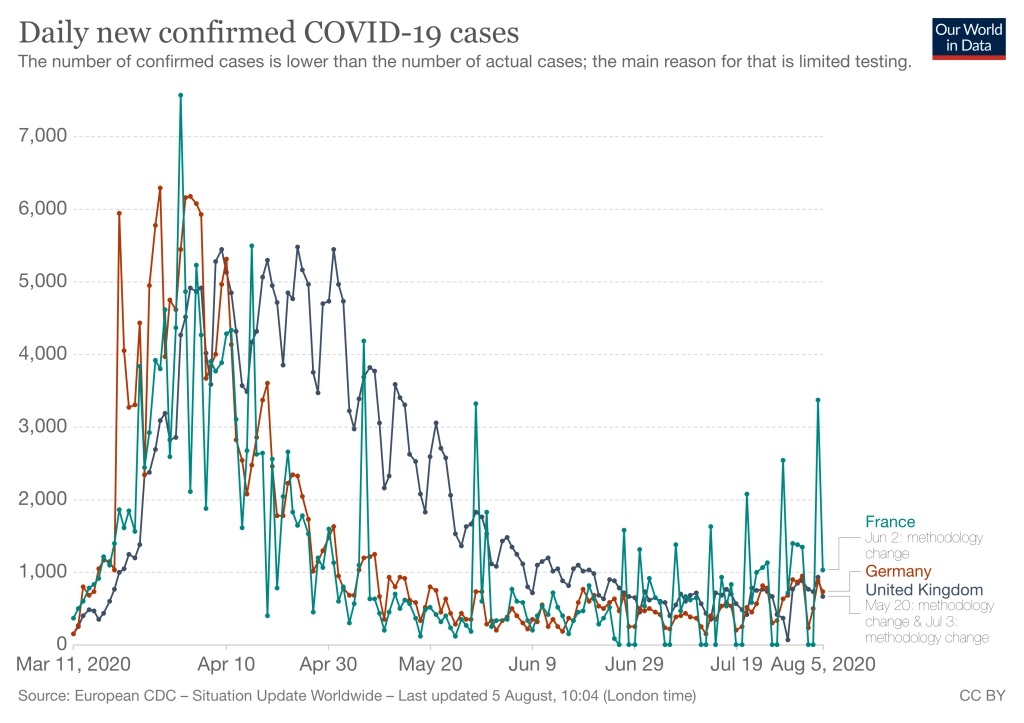英國(guó)在疫情初期取消邊境管制,,被指責(zé)是“嚴(yán)重錯(cuò)誤”
英國(guó)議員在一份言辭激烈的跨黨派報(bào)告中指責(zé)政府在3月份新冠疫情愈演愈烈的時(shí)候,,在邊境控制問(wèn)題上猶豫不決,,結(jié)果導(dǎo)致成千上萬(wàn)人被感染。英國(guó)政府對(duì)這些指責(zé)做出了反擊,。
英國(guó)在六月初才開(kāi)始執(zhí)行嚴(yán)格的邊境管制措施,,要求所有人入境時(shí)必須自我隔離兩周,違者將面臨罰款,。這比其他許多國(guó)家已經(jīng)晚了接近三個(gè)月,。許多國(guó)家早已開(kāi)始執(zhí)行邊境管制,要求入境人員隔離或至少接受健康檢查,。
2月份和3月初疫情爆發(fā)之初,,英國(guó)曾經(jīng)對(duì)從中國(guó)、伊朗和意大利入境的旅客執(zhí)行過(guò)一些管制措施,,但在3月13日卻突然取消了邊境管制。英國(guó)的疫情遠(yuǎn)比其他歐洲國(guó)家嚴(yán)重,,目前英國(guó)因新冠肺炎造成的死亡人數(shù)超過(guò)4.6萬(wàn)人,,確診病例為30.6萬(wàn)例,。
鮑里斯·約翰遜政府為什么會(huì)在三月中旬做出那個(gè)重大的決定呢?英國(guó)議會(huì)內(nèi)政事務(wù)委員會(huì)(Home Affairs Committee)也想知道這個(gè)問(wèn)題的答案,,并在周三公布了它的結(jié)論。
內(nèi)政事務(wù)委員會(huì)在周三的聲明中表示:“委員會(huì)無(wú)法找到任何科學(xué)證據(jù),,證明這個(gè)莫名奇妙的決定是合理的,在三月中旬沒(méi)有執(zhí)行任何專門的邊境管制措施是嚴(yán)重錯(cuò)誤,?!?/font>
該委員會(huì)在附帶的報(bào)告中寫道:“如果盡早采取嚴(yán)格的措施,比如要求入境人員強(qiáng)制隔離等,,有可能會(huì)抑制病毒的傳播速度,。尤其是沒(méi)有建議從西班牙入境或回國(guó)人員自我隔離14天……或者至少監(jiān)控癥狀和撥打[國(guó)家醫(yī)療服務(wù)熱線],,是一個(gè)錯(cuò)誤?!?/font>
負(fù)責(zé)邊境管制的英國(guó)內(nèi)政部很快對(duì)此予以反駁,。
內(nèi)政部稱:“內(nèi)政事務(wù)特別委員會(huì)的論述是錯(cuò)誤的。我們?cè)谝咔槠陂g的所有決策都以科學(xué)為依據(jù),,都是在正確的時(shí)間采取的恰當(dāng)措施,都是為了保護(hù)全體國(guó)民的安全,?!?/font>
“當(dāng)英國(guó)感染水平較低時(shí),隨著旅客數(shù)量大幅減少,,科學(xué)建議明確顯示,,對(duì)外國(guó)入境人員執(zhí)行隔離措施是最有效的。因此,,隨著英國(guó)疫情得到控制,,我們?cè)?月8日?qǐng)?zhí)行了邊境管制措施,旨在保護(hù)公眾健康,,避免爆發(fā)令國(guó)家醫(yī)療服務(wù)疲于應(yīng)對(duì)的第二波疫情高峰,。”

事實(shí)上,許多專家指出,,當(dāng)病毒已經(jīng)形成社區(qū)傳播的時(shí)候,,關(guān)閉邊境對(duì)控制疫情的效果有限。他們認(rèn)為在這種情況下,,病毒檢測(cè),、治療和接觸者跟蹤才是重點(diǎn)。
但內(nèi)政事務(wù)委員會(huì)在報(bào)告中否定了內(nèi)政部關(guān)于旅客數(shù)量的說(shuō)法,。
報(bào)告稱:“雖然旅客數(shù)量開(kāi)始下降,,但從3月13日到3月23日?qǐng)?zhí)行封鎖措施,依舊有100萬(wàn)人入境,,截至4月中旬可能又增加了數(shù)十萬(wàn)人,。這其中可能有數(shù)千人已經(jīng)感染了新冠肺炎?!?/font>
內(nèi)政部反駁稱,,其并沒(méi)有在3月13日撤銷隔離指導(dǎo)意見(jiàn),只是該指導(dǎo)意見(jiàn)被“全國(guó)居家隔離指導(dǎo)意見(jiàn)取代,?!?/font>
內(nèi)政部回應(yīng)內(nèi)政事務(wù)委員會(huì)的報(bào)告稱:“委員會(huì)已經(jīng)做出了解釋,,這意味著任何人進(jìn)入英國(guó)境內(nèi),只要出現(xiàn)癥狀,,必須與其他國(guó)民一樣自我隔離,。”
問(wèn)題是英國(guó)在3月23日才開(kāi)始執(zhí)行恰當(dāng)?shù)姆怄i措施,。內(nèi)政事務(wù)委員會(huì)稱,,中間間隔的十天既沒(méi)有全國(guó)封鎖,也沒(méi)有嚴(yán)格的邊境管制,,“這是嚴(yán)重的錯(cuò)誤,大幅加快了疫情在英國(guó)蔓延的速度和規(guī)模,,這意味著有更多人感染了新冠肺炎,。”
醫(yī)學(xué)專家們似乎站在內(nèi)政事務(wù)委員會(huì)一邊,。
卡迪夫大學(xué)(Cardiff University)醫(yī)學(xué)院院長(zhǎng)安德魯·弗里德曼在一份聲明中表示,,“如果政府采取不同的措施,會(huì)減少多少感染者,,”這無(wú)法確定,,但“3月中旬取消了對(duì)入境旅客的自我隔離要求以及初期防疫工作的松懈,確實(shí)是導(dǎo)致大量輸入病例的罪魁禍?zhǔn)?,你很難否認(rèn)這個(gè)結(jié)論,。”
“顯然英國(guó)的政策與歐洲和全世界其他許多國(guó)家的做法是截然不同的,?!保ㄘ?cái)富中文網(wǎng))
翻譯:劉進(jìn)龍
審校:汪皓
英國(guó)議員在一份言辭激烈的跨黨派報(bào)告中指責(zé)政府在3月份新冠疫情愈演愈烈的時(shí)候,在邊境控制問(wèn)題上猶豫不決,,結(jié)果導(dǎo)致成千上萬(wàn)人被感染,。英國(guó)政府對(duì)這些指責(zé)做出了反擊。
英國(guó)在六月初才開(kāi)始執(zhí)行嚴(yán)格的邊境管制措施,,要求所有人入境時(shí)必須自我隔離兩周,,違者將面臨罰款。這比其他許多國(guó)家已經(jīng)晚了接近三個(gè)月,。許多國(guó)家早已開(kāi)始執(zhí)行邊境管制,,要求入境人員隔離或至少接受健康檢查。
2月份和3月初疫情爆發(fā)之初,,英國(guó)曾經(jīng)對(duì)從中國(guó),、伊朗和意大利入境的旅客執(zhí)行過(guò)一些管制措施,但在3月13日卻突然取消了邊境管制,。英國(guó)的疫情遠(yuǎn)比其他歐洲國(guó)家嚴(yán)重,,目前英國(guó)因新冠肺炎造成的死亡人數(shù)超過(guò)4.6萬(wàn)人,,確診病例為30.6萬(wàn)例。
鮑里斯·約翰遜政府為什么會(huì)在三月中旬做出那個(gè)重大的決定呢,?英國(guó)議會(huì)內(nèi)政事務(wù)委員會(huì)(Home Affairs Committee)也想知道這個(gè)問(wèn)題的答案,,并在周三公布了它的結(jié)論。
內(nèi)政事務(wù)委員會(huì)在周三的聲明中表示:“委員會(huì)無(wú)法找到任何科學(xué)證據(jù),,證明這個(gè)莫名奇妙的決定是合理的,,在三月中旬沒(méi)有執(zhí)行任何專門的邊境管制措施是嚴(yán)重錯(cuò)誤?!?/font>
該委員會(huì)在附帶的報(bào)告中寫道:“如果盡早采取嚴(yán)格的措施,,比如要求入境人員強(qiáng)制隔離等,有可能會(huì)抑制病毒的傳播速度,。尤其是沒(méi)有建議從西班牙入境或回國(guó)人員自我隔離14天……或者至少監(jiān)控癥狀和撥打[國(guó)家醫(yī)療服務(wù)熱線],,是一個(gè)錯(cuò)誤?!?/font>
負(fù)責(zé)邊境管制的英國(guó)內(nèi)政部很快對(duì)此予以反駁,。
內(nèi)政部稱:“內(nèi)政事務(wù)特別委員會(huì)的論述是錯(cuò)誤的。我們?cè)谝咔槠陂g的所有決策都以科學(xué)為依據(jù),,都是在正確的時(shí)間采取的恰當(dāng)措施,,都是為了保護(hù)全體國(guó)民的安全?!?/font>
“當(dāng)英國(guó)感染水平較低時(shí),,隨著旅客數(shù)量大幅減少,科學(xué)建議明確顯示,,對(duì)外國(guó)入境人員執(zhí)行隔離措施是最有效的,。因此,隨著英國(guó)疫情得到控制,,我們?cè)?月8日?qǐng)?zhí)行了邊境管制措施,,旨在保護(hù)公眾健康,避免爆發(fā)令國(guó)家醫(yī)療服務(wù)疲于應(yīng)對(duì)的第二波疫情高峰,?!?/font>
事實(shí)上,許多專家指出,,當(dāng)病毒已經(jīng)形成社區(qū)傳播的時(shí)候,,關(guān)閉邊境對(duì)控制疫情的效果有限。他們認(rèn)為在這種情況下,,病毒檢測(cè),、治療和接觸者跟蹤才是重點(diǎn)。
但內(nèi)政事務(wù)委員會(huì)在報(bào)告中否定了內(nèi)政部關(guān)于旅客數(shù)量的說(shuō)法。
報(bào)告稱:“雖然旅客數(shù)量開(kāi)始下降,,但從3月13日到3月23日?qǐng)?zhí)行封鎖措施,,依舊有100萬(wàn)人入境,截至4月中旬可能又增加了數(shù)十萬(wàn)人,。這其中可能有數(shù)千人已經(jīng)感染了新冠肺炎,。”
內(nèi)政部反駁稱,,其并沒(méi)有在3月13日撤銷隔離指導(dǎo)意見(jiàn),,只是該指導(dǎo)意見(jiàn)被“全國(guó)居家隔離指導(dǎo)意見(jiàn)取代?!?/font>
內(nèi)政部回應(yīng)內(nèi)政事務(wù)委員會(huì)的報(bào)告稱:“委員會(huì)已經(jīng)做出了解釋,,這意味著任何人進(jìn)入英國(guó)境內(nèi),只要出現(xiàn)癥狀,,必須與其他國(guó)民一樣自我隔離,。”
問(wèn)題是英國(guó)在3月23日才開(kāi)始執(zhí)行恰當(dāng)?shù)姆怄i措施,。內(nèi)政事務(wù)委員會(huì)稱,中間間隔的十天既沒(méi)有全國(guó)封鎖,,也沒(méi)有嚴(yán)格的邊境管制,,“這是嚴(yán)重的錯(cuò)誤,大幅加快了疫情在英國(guó)蔓延的速度和規(guī)模,,這意味著有更多人感染了新冠肺炎,。”
醫(yī)學(xué)專家們似乎站在內(nèi)政事務(wù)委員會(huì)一邊,。
卡迪夫大學(xué)(Cardiff University)醫(yī)學(xué)院院長(zhǎng)安德魯·弗里德曼在一份聲明中表示,,“如果政府采取不同的措施,會(huì)減少多少感染者,,”這無(wú)法確定,,但“3月中旬取消了對(duì)入境旅客的自我隔離要求以及初期防疫工作的松懈,確實(shí)是導(dǎo)致大量輸入病例的罪魁禍?zhǔn)?,你很難否認(rèn)這個(gè)結(jié)論,。”
“顯然英國(guó)的政策與歐洲和全世界其他許多國(guó)家的做法是截然不同的,?!保ㄘ?cái)富中文網(wǎng))
翻譯:劉進(jìn)龍
審校:汪皓
The British government has pushed back against lawmakers who, in a damning cross-party report, accused it of dithering over border controls as the COVID-19 pandemic gathered steam in March—dooming thousands of people to infection as a result.
The U.K. only instituted strict entry controls in early June, when it started requiring everyone arriving in the country to self-isolate for two weeks or face fines. This was nearly three months after many other countries introduced controls requiring quarantine or at least health screening on arrival.
The country had imposed some controls on people arriving from China, Iran and Italy quite early in the crisis, in February and early March, but then it abruptly lifted them on March 13. The U.K. went on to be hit harder than any other European country, with a death toll that currently stands above 46,000, and a confirmed infection count of 306,000.
Why did Boris Johnson's government make that fateful mid-March decision? That's what Parliament's Home Affairs Committee wanted to know, and on Wednesday it delivered its verdict.
"The Committee was unable to find any scientific evidence to justify this inexplicable decision and says that the failure to have any special border measures in place in mid-March was a serious error," it said in a Wednesday statement.
"Had stronger early measures been taken—such as requiring legally-enforceable quarantine for arrivals—it is likely that the spread of the virus could have been slowed," the committee stated in the accompanying report. "The failure to advise people travelling or returning from Spain in particular to self-isolate for 14 days… or, at the very least, to monitor symptoms and call [the National Health Service or NHS's hotline] was a mistake."
The Home Office—the government department responsible for border controls—was quick to hit back.
"The Home Affairs Select Committee are incorrect in their assertions," the Home Office said. "All of our decisions throughout the pandemic have been guided by the science, with appropriate measures introduced at the right time to keep us all safe."
"And with passengers numbers significantly reduced, the scientific advice was clear that quarantine measures for those entering the country from abroad would be most effective when the U.K. has a lower level of infection. Therefore, as the virus was brought under control here, border measures were introduced on June 8 to protect public health and help avoid a second peak that would overwhelm the NHS."
U.K. COVID cases (dark blue line) have shown a different trajectory from that of its European neighbors. Some health experts blame the U.K.'s protracted curve on its hesitance to act in the initial weeks of the outbreak.
Indeed, many experts have pointed out that border closures have limited effect when a virus is already rampant in the community, and have argued that the focus under such circumstances should be on testing, treatment and contact-tracing.
But the committee rejected the Home Office's argument about passenger numbers in its report.
"Although passenger numbers started to fall, a further one million people were to arrive between 13 March and lockdown on 23 March, and possibly hundreds of thousands more by mid-April. That is likely to have included thousands of people with COVID-19," it said.
The Home Office countered that it had not in fact dropped isolation guidance on March 13, but rather that this guidance had been "superseded by the national stay at home guidance."
"As has been explained to the committee, this meant that anyone entering the country, like the rest of the population, was required to self-isolate if they developed symptoms," the department said in response to the report.
The problem there is that the government only introduced a proper lockdown in the U.K. on March 23. That 10-day gap—with no national lockdown and no strict border controls—"was a serious mistake that significantly increased both the pace and the scale of the epidemic in the U.K., and meant that many more people caught COVID-19," the committee wrote.
Medical experts seem to be on the committee's side.
Andrew Freedman, head of Cardiff University's School of Medicine, said in a statement that it is impossible to be "certain how many fewer infections there would have been, had things been done differently," but "it is hard to disagree with the conclusion that the removal of any requirement for arriving travelers to self-isolate in mid-March, as well as the lax arrangements earlier on, did lead to a large influx of imported cases."
"The U.K. policy was clearly at odds with those of many other countries in Europe and around the world."













